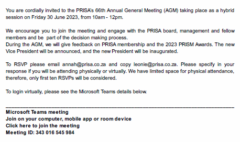AFRICA Brand Summit 2020 Hybrid
October 12, 2020 2020-10-12 22:59AFRICA Brand Summit 2020 Hybrid
AFRICA Brand Summit 2020 Hybrid
Explaining AFRICA Brand Summit 2020
Rationale: Having successfully hosted the Brand Summit South Africa in Cape Town in May 2018, then in Sandton, South Africa, in June 2019, calls have continued to grow for the event’s thematic and strategic focus to move faster and address more Pan-African issues, instead of just one country. “The Public Relations Institute of Southern Africa (PRISA) ceased the moment and climbed on the bandwagon. We look back and marvel but what is more fulfilling is the growth and realisation of how much needed are these disruptive conversations.” says Victor Sibeko, PRISA’s Chief Executive Officer.
Forming part of the Summit were Master Classes on Country Communication looking at role of Public Relations in handling Brand and Image hosted by Dr. Dalien Rene Benecke – PRISA Immediate past president and Strategic Communication at University of Johannesburg (UJ) and Victor Sibeko – PRISA past president and current Chief Executive Officer (CEO).
Destination perception issues at country-level also reappear at continental level, at home and abroad, and inform attitudes about individual countries and the entire African continent. Ultimately, perceptions inform investor sentiments and attitudes. They can make or break any destination’s success in generating goodwill, which is the basis for positive engagements with the outside world.
Individual countries in Africa and the continent at a broad level continue to fail using all of their resources and potential to benefit African economic development and to position the continent as net exporter of food crops, a magnet for key and rare global skills, a magnet for foreign tertiary students seeking quality higher education whose credentials are respected around the world, as well as a magnet for lucrative foreign exchange earning business in Meetings, Incentives, Conferences, and Events.
African leaders must also work harder at creating an enabling environment for cross-country and regional business; growth of the agrarian economy, seamless movement of goods and skills, as well as business friendly customs regimes where companies, especially established brands that work across various borders, do not get subjected to unnecessary red tape.
Project context: In the minds of millions of people around the world, especially those who have never been to Africa, perceptions about Africa tend to be negative, on the whole. Immediate associations with Africa/ being African, often stereotypically reference poverty, corruption, laziness, maladies, backwardness, archaic traditional systems, mores that stand in the way of modernity, etc.
Such perceptions often work against all efforts to promote Africa as a place to do business, to go for tertiary studies, etc. In the end, they impede Africa’s full integration into the world economy on an equal footing, as a place of new knowledge creation and innovation beyond it being a mere source of natural resources for more developed economies.
Since the Africa Brand Summit proposes to become a respected platform for frank, politically unaligned, conversations – a place where Africans get to look into the mirror and acknowledge their own role in Africa’s perennially negative image – some people might find it to be an uncomfortable platform to participate in.
To date, we have managed to attract the participation of highly respected, ethical, and inspirational leaders in the public service, private business, civil society, media, etc. to speak at the summit. They have come from South Africa, Namibia, Nigeria, Ethiopia, Benin, Cameroon, Ghana, USA, Burkina Faso, Finland, Russia, Hungary, India, the UK, Switzerland, Portugal, Bulgaria, etc. Their impact, individually and collectively, has raised the bar for us. We intend to keep it that way.
In the minds of millions of people around the world, especially those who have never been to Africa, perceptions about Africa tend to be negative, on the whole. Immediate associations with Africa/ being African, often stereotypically reference poverty, corruption, laziness, maladies, backwardness, archaic traditional systems, mores that stand in the way of modernity, etc.
Justification for the project: Individual countries in Africa, and the continent as a whole, continue to suffer from perceptions, at home and around the world, that continue to work against the continent’s need to generate global esteem and respect;
o As a result of the generally negative perceptions of Africa and what it means to be African, Africans tend to be negatively profiled and treated with suspicion when they:
1) Go through customs/passport control around the world;
2) Enter restaurants, stores, business meetings, etc.;
3) Apply for or arrive at new professional appointments, as they get assumed to be incompetent/potential criminals until they prove themselves otherwise, even when they possess respected academic qualifications and are experienced in their field of expertise.
o To initiate, facilitate and host frank, pan-African, conversations about the current image of Africa (continent’s brand image) and how it impacts perceptions, goodwill and, eventually, socio-economic development and
o To eventually establish an Africa-based global destination image ‘research and advisory service’ to provide globally applicable best practice in destination branding, positioning, and destination reputation management. The service’s approach will aim to be 80% proactive and 20% curative, helping countries understand possible reputational ramifications of new policy proposals before they are adopted (80%). There will also be crisis recovery advisory services on how best to manage ‘in crisis’ and ‘post-crisis’ communication.






